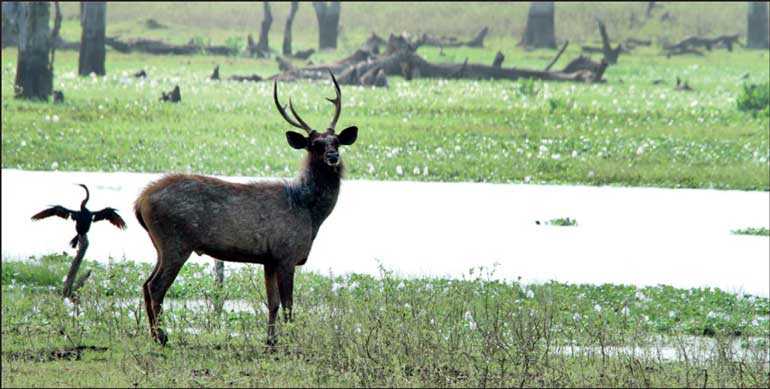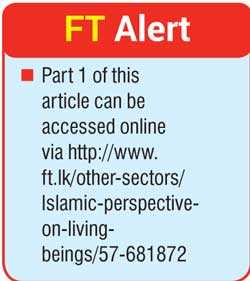Tuesday Feb 17, 2026
Tuesday Feb 17, 2026
Saturday, 20 July 2019 00:10 - - {{hitsCtrl.values.hits}}

The Harmony Page is generating a series of articles on how ancient as well as current spiritual and religious philosophies look at environment protection in their scriptures. The article below is part of this series.
By Dr. Mohamed Safiullah Munsoor
(Continued from last week)
The ‘middle-way’
In order to maintain this delicate balance of our interrelatedness with all beings, it calls for a balanced approach to life, what Buddhism calls ‘majjahimapatipadda’ or in Islam ‘Al-Wasatiyya’ (Dastagir and Ramzy,2019),which in both cases denotes the ‘middle-way’. This means not only a path of moderation with the exclusion of extremes but also being sensitive to and caring for life as a whole.
In essence, the art of holistic living. It is through this path that is said to be the road to developing a greater vision, knowledge, calmness, insightfulness and towards greater consciousness as professed both by the Buddha (Ibid) and the Prophet (Al-Ghazali, 1991), both of whom were fully cognisant of the folly of the extremes of life be it in food, religion, speech or in one’s behaviour.
In the light of the eco-system, the recently conceptualised Islamic Ecological Paradigm (IEP), which is based on the fundamental concepts in Islamic tradition – tawhid (divine unity), khilafah (trusteeship), and akhira (the hereafter) is gaining attention amongst scholars and activists (Islam & Islam, 2015). Further details of the IEP and Eco-Islam can be found in the research work of Abdelzaher et al (2019) and Islam et al (2015). Given that IEP is deeply rooted within the Islamic tradition, this can be a framework that can be used to address the environmental issues and hazards that is affecting us, including care for the rights of the animals and issues relating to ecological destructions and thinking out ways to regenerate our environment, which quintessentially is a part of us.
In essence by not observing the rights of animals, which is inter-linked with their vegetative habitation, it affects our eco-system, impacting on our well-being as well as on the environment. This is cause for concern and it calls us to ponder seriously and take steps to revert towards a balanced life, which can positively influence our mind-body-mind-environment in order to sustain us as well as the future generations.
(Note: The respect and salutations of peace and blessings for the Prophet and the Buddha are accorded as per their respective faith traditions.)
References:
Abdelzaher, Dina, Kotb, Amr&Helfaya (2019, Eco-Islam: Beyond the Principles of Why and What and Into the Principles of How, Journal of Business Ethics 155 (3(, 623-643
Al- Bukhari, Abū‘AbdAllāhMuḥammadibnIsmā’īlibnIbrāhīmibn al-MughīrahibnBardizbah al-Ju’fī al-BukhārīSahih Al Bukhari (1997, Arabic-~English, Trans. Dr. Muhammad Muhsin Khan, Darussalam Publication, Riyadh. The first narration is by Abu Huraira and the second is by Abdullah ibn `Umar as recorded in Sahih al Bukhari.
Al-Ghazali (1991), The Revival of Religious Sciences (Ihya-Ulum-id-din), the seminal works in four volumes, Trans. Faisal Karim, Four Volumes, Islamic Book Services, New Delhi
Ali, Sharique A., Parveen, Naima and Ali, Ayesha S, Links between the Prophet Muhammad (PBUH) recommended foods and disease management: A review in the light of modern superfoods; InternationalJournal of Health Sciences (Qassim). 2018 Mar-Apr; 12(2): 61–69,
Al-Qu’ran, Sura 6, Verse 38
Al-Qu’ran, Sura 24, Verse 41
Al-Tabrizi, Wali-ud-din Mohammad Bi Abdullah Al-Khatib Al-Umari, Mishkatul-Masabih, 3rd Edition, Trans and annotated Abdul HameedSiddiqui, KitabBhavan, New Delhi, India
Anwar, Amna (2017), The Prophet’s (PBUH) Diet Plan, Islamic Finder, individual; last retrievhttps://www.islamicfinder.org/news/prophet-muhammads-pbuh-diet/.
Banaei, Mehran and Haque, Nadeem (2014), Are rights synthetically prescribed to animals, or are they inherently pre-existence?. International Journal of Al-Mizan, Volume 1, Issue 1, August 2014, p 9
 Brahmavamso, Ajahn (1990) cites the Book of Discipline, Volume 4, p 324, Newsletter, April-June 1990, Buddhist Society of Western Australia, Urban Dharma.org; last retrieved 11th July 2019; https://www.urbandharma.org/udharma3/meat.html.
Brahmavamso, Ajahn (1990) cites the Book of Discipline, Volume 4, p 324, Newsletter, April-June 1990, Buddhist Society of Western Australia, Urban Dharma.org; last retrieved 11th July 2019; https://www.urbandharma.org/udharma3/meat.html.
Dastagir, Golam and Ramzy, Mohammad Ismath (2019), Understanding “The Other”, Buddhist-Islam Dialogue For Peace with particular reference to ‘Moderation’, Al Shajarah, Journal of Islamic Thought and Civilisation, The International Islamic University, Malaysia (IIUM), Volume 24, Number 1. This has citation from the ThanissaroBhikkhu (trans.), “Maha-Saccaka-Sutta): The longer discourse to Saccaka (MahaSaccakaSutta of the MajjhimaNikaya, MN 36, 2008)
DhammaWiki (2019), Jainism and Buddhism, last retrieved 11th July 2019; https://dhammawiki.com/index.php/Buddhism_and_Jainism
Islam, Md. Nazrul and Islam, Md. Saidul (2015), Human-Animal Relationship: Understanding Animal Rights in the Islamic Ecological Paradigm, Journal for the Study of Religions and Ideologies, Vol. 14, Issue (Summer 2015): 96-126. The concept of the ‘green Prophet’ is cited from Davary, Bahar (2012) on Islam and Ecology and the ‘avant la lettre’ from De Chatel, Francesca (2008) on Prophet Mohammed (SAW): A Pioneer of the Environment.
Muslim, AbulHussain (2007), Sahih Muslim, 1st Edition,Edited Hafiz Abu TahirZubair Ali Za’l& Huda Khattab. Trans. Nasiruddin al-Khattab, Darussalam Publication, Riyadh, Saudi Arabia
New York Times (NYT), 2008, The Staggering Cost of Raising Meat Production, International Business, Mark Bittman, 28 January 2008
Ramadhan, Tariq (2007) In the Footsteps of the Prophet: Lessons in the Life of Muhammad, Oxford University Press, UK, p 175
Wu, Guoyao(2016), Dietary protein intake and human health,Royal Society of Chemistry,Departments of Animal Science and Medical Physiology and Faculty of Nutrition, Texas A&M University, College Station, Texas 77843, USA. DOI: 10.1039/C5FO01530H (Review Article) Food Funct., 2016, 7, 1251-1265
Pic by Tharinda Elvitigala
(The writer is a Sri Lankan national who studied at Royal College, Colombo and moved on to complete his first Ph.D. in International Rural Development with focus on Local Organisations in Myanmar (University of Reading, United Kingdom) and his second Ph.D. in Spiritual Leadership and Self Development: A Case Study of a Spiritual Order in Malaysia (University of Malaya). He is currently the Director Programmes, with the International Dialogue Centre (KAICIID), Vienna, Austria involved in Interreligious Dialogue in Peacebuilding.)